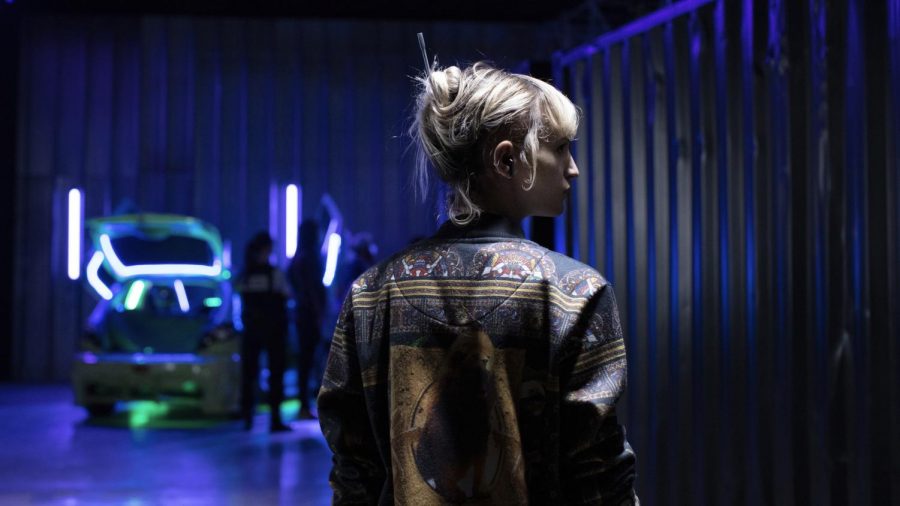Movie Review: Titane
Photo By: Kazak Productions
Julia Dorconau’s Titane first showed up on most film lovers’ radar when Spike Lee accidentally revealed that it had one top prize at the prestigious Cannes Film Festival early. Sure the mistake was comical but shouldn’t distract from the impact of this win. Dorconau becomes the only second woman director to take this prize. Uon being asked by presenter Sharon Stone how she feels about winning the award, she responded that she felt like she was making history. And she’s absolutely right.
Titane should be a movie that makes history. It is a bold film that proudly flaunts its weirdness and dares to shock it’s audience while simultaneously tugging at their heartstrings. It breaks norms; as many gender norms as it does filmmaking norms.
I saw Titane the night after it opened with a group of friends and we arrived at the mildly crowded theater with nervous anticipation. What ensued is one of the greatest theatrical experiences of my life. Dorconau’s pulse pounding thriller made me shriek with terror and shock and made my jaw drop and surprisingly erupt with laughter. Dorconau fills her story with shockingly gruesome sequences but makes them watchable through impeccable elements of unexpected irony and humor. Sequence after sequence, the film had me on my toes trying (and failing) to guess where the movie would be heading.
For different people different elements of Titane might stick out. For some it will be the gruesome imagery and shocking horror that the story is set upon. For others it might be the heartwarming story about family lurking underneath it’s bloody cold exterior, for others it could just be the sleek aesthetic Julia Dorconau captivates with her neon cinematography and killer soundtrack. But personally I was most captivated by Dorconau’s allegorical exploration of gender fluidity that lies inside this shocking and absurdly gruesome horror flick.
Initially, a story about a queer, female presenting serial killer named Alexia going through a hard pregnancy whoe struggles to connect with people that disguises themself as a male firefighter to avoid the cops may seem like an odd way to explore gender fluidity but Dorconau represents this crisis of gender identity in touching ways.
Alexia, while assuming of a man, finds themself to be conflicted between their two identities. On the one hand they are comforted by the masculin environment of the all men fire station and seem to find safety in the ultra machismo of their co workers. But on the other hand Alexia does have some longing for their former identity and in secret tries on a dress and through all of this confusing gender turmoil, they are faced with a constant reminder of womanhood with their pregnancy.
But Dorcornau does not stop there in this exploration of gender fluidity and expression. She adds in the element of being in constant fear of judgment for your gender expression. At times Alexia seems excited to bind and hide their pregnancy and go out into the world presenting as a man; at others they seem to be dreading it but either way they live in fear of not being accepted. Most importantly they live in fear of being judged by their co-worker/surrogate father (figure), Vincentt, who they form a heartwarming relationship with. Dorconau uses sequence after sequence of suspense, and dark humor, to build this relationship up and by the last 20 minutes the audience wants to get down on their knees and pray that Vincent will accept them.
But one could not begin to be engrossed in the story if it were not for the two stunning lead performances from Agathe Rouselle and Vincent Lindon. Agathe Rouselle who had never acted a day in her life before this movie was cast because of her adrogynous style and taught herself acting through watching monologues from Twin Peaks, and Network, she learned the physicality of Alexia by studying boxing. This unconventional origin lead into what is one of the most masterful performances I have seen in a horror movie. She displays turmoil and rage and frustration with the slightest of eye movements and presents an expressive physicality required for an almost nonverbal performance. Vincent Lindon functions as the heart of the movie, pumping life into the dark rough exterior. He is heartwarming and hilarious and when need be relentlessly real and powerful. The two actors deliver performances that hit you like a freight train.
Detractors can (and some have) called it lacking it, overly shocking, and heartless. However, no matter your enjoyment of it, I think we all owe Julie Dorconau a round of applause for her brave ideas and genius vision and creativity. We also owe a thank you to her for creating a cinematic experience that’s more akin to a rollercoaster than any other movie going experience of your lifetime.



